|
|
|
Sort Order |
|
|
|
Items / Page
|
|
|
|
|
|
|
| Srl | Item |
| 1 |
ID:
075862
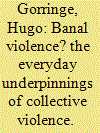

|
|
|
|
|
| Publication |
2006.
|
| Summary/Abstract |
Outbursts of collective violence are often (understandably) met by expressions of outrage or condemnation. 'How is it,' accounts muse, 'that ordinary people can commit such atrocities?' This article argues that an exclusive focus on the violent act can contribute little to our understanding. Instead, it seeks to elucidate the routine processes and actions that serve to render violence acceptable (even banal) as a mode of action. Exclusive identities and a powerful rhetoric of honour, pride, and shame persuade people that violence is either desirable or even necessary in a given context. Following Billig's account of banal nationalism, I argue that grasping these mundane day-to-day processes is essential for an understanding of collective violence. The article draws on research amongst caste-based movements in South India to support this argument.
|
|
|
|
|
|
|
|
|
|
|
|
|
|
|
|
| 2 |
ID:
155376
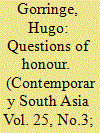

|
|
|
|
|
| Summary/Abstract |
Recent caste conflicts have revolved around discourses of honour, caste pride and shame. Although Dalit movements have been at the receiving end of the violence and have condemned the casteism underpinning it, they operate within a society in which questions of honour are highly significant. Dalit women activists are trapped in an unenviable position within the twin structures of caste and patriarchy, both of which speak to debates about group boundaries and honour. Taking the recent violence as its starting point, this paper draws on interviews with and observations of Dalit women in the Viduthalai Chiruthaigal Katchi (Liberation Panther Party) in Tamil Nadu to chart how discourses of honour both facilitate and constrain their capacity to act. For all the party’s emphasis on women’s rights, women activists face an uphill struggle to secure recognition, respect and responsiveness both within the party as well as wider society.
|
|
|
|
|
|
|
|
|
|
|
|
|
|
|
|
| 3 |
ID:
098875
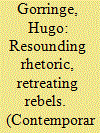

|
|
|
|
|
| Publication |
2010.
|
| Summary/Abstract |
Oratory is an important aspect of Tamil culture, and people delight in the poetic flourishes of podium speakers. It is no surprise, therefore, that the leader of the largest Dalit movement in Tamilnadu is revered for linguistic prowess. The significance of movement utterances, however, extends beyond content and style. In recent decades, Dalit rhetoric has increasingly promised to 'hit back'. Although these perorations have been credited with instilling a sense of pride, courage and assertiveness into previously submissive social groups, such analyses often take movement oratory at face value. A more contextualised reading of such speech-acts reveals that whilst 'hitting back' can restore a sense of pride, it can also undermine Dalit agency by reinforcing their characterisation as victims. In a vicious circle, radical rhetoric stokes the fires of caste conflict, which then inspires further tales of victimisation. Celebrations of Dalit lyricism, therefore, need to be tempered by an appreciation of its context and consequences.
|
|
|
|
|
|
|
|
|
|
|
|
|
|
|
|
| 4 |
ID:
165934
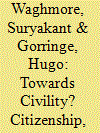

|
|
|
|
|
| Summary/Abstract |
Civility is generally lost in translation in non-Western contexts, and tends to be limited to its liberal form in the social sciences. To address this impasse of West versus East, individual versus community, and political versus civil society, we seek to recover the idea of civility. In this special section, we understand civility as socio-cultural processes and politics that challenge the lack of publicness and commitment to public life, equality and justice in society. We suggest that civility provides insights into the social life of democracy and the lived challenges to social democracy. The essays in this special section critically explore and engage with the paradox of high democracy and low civility that plagues India, where democratic consolidation translates into limited justice and minimal equality, along with increased exclusion and performative violence against marginal groups. The papers in this special section offer fine-grained and detailed analyses of social interactions across India. In doing so, they make a strong case for shifting from analyses of formal democracy and civil society toward the question of civility. Such a move enables us to explore justice, equality and emancipation as social processes, struggles and experiences rather than as preconditions for democratic societies.
|
|
|
|
|
|
|
|
|
|
|
|
|
|
|
|
| 5 |
ID:
165250
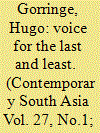

|
|
|
|
|
| Summary/Abstract |
Between 2009 and 2014, Thirumavalavan, the leader of the largest Dalit party in Tamil Nadu, served as an MP in Delhi. This paper draws on research with the Viduthalai Chiruthaigal Katchi (VCK or Liberation Panther Party) to raise a number of key questions about representation and democracy in a multi-level federal system. Although they are a minor party, their experience of national politics offers insights into the workings of party systems in India. The paper considers the extent to which they are constrained by alliance partners and political rules-of-the-game. It then considers the question of representation, and asks what the VCK managed to achieve in Thirumavalavan’s constituency of Chidambaram and the extent to which they could raise issues at the national level both through formal and disruptive means. Finally, the paper reflects on the advantages and disadvantages for a small party of having a foothold in the Centre and draws out the lessons of the VCK’s experience for our understanding of Indian politics.
|
|
|
|
|
|
|
|
|
|
|
|
|
|
|
|
|
|
|
|
|